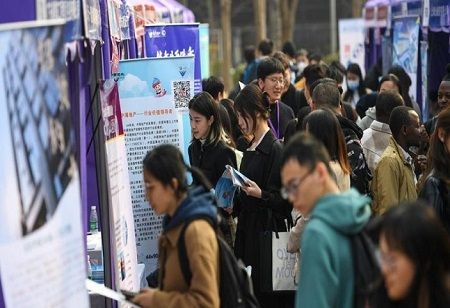China has emphasized the importance of high-quality, full employment for its people, committing to allocate more resources towards enhancing talent development systems, fostering new industries, and improving employment services. The goal is to ensure fair and equitable access to job opportunities. Recently, the State Council, China's Cabinet, released a guideline outlining 24 specific measures aimed at promoting high-quality employment. These measures focus on adjusting the education system, nurturing emerging industries, and safeguarding workers' rights and benefits.
The guideline mandates local authorities to generate more high-quality job opportunities by modernizing traditional industries and cultivating new sectors like manufacturing, modern services, and modern agriculture, aimed at attracting more workers. Emphasis is also placed on developing the platform economy, green economy, and silver economy, as these areas hold significant potential for creating employment opportunities.
Pang Shi, director of the Employment and Entrepreneurship Department at the Chinese Academy of Personnel Science, stated that the focus on high-quality employment in the guideline aligns with the country's high-quality socioeconomic development and technological progress.
“Workers in high-quality employment usually have reasonable salary increases following periods of economic growth and their professionalism and working abilities can be improved through improved training and technological progress”, she said, adding that workers’ relations with employers and their safety can be fully secured under high-quality employment, and they also enjoy more sound protection of their rights.
The guideline outlines plans for the government to enhance both higher education and vocational education systems. It calls on colleges and universities to increase student enrollment in science-related fields, as well as in agriculture and healthcare disciplines. Additionally, institutions are encouraged to tailor their curricula to better align with the actual needs of employees and industries.
Moreover, the hiring prospects of graduates will be considered a crucial criterion for assessing the teaching quality of a major and for future enrollment strategies. Disciplines that show poor job placement outcomes will undergo review. The guideline emphasizes vocational education and flexible employment as essential avenues for creating job opportunities. It also states that more skills training centers will be set up, and companies are encouraged to establish vocational schools to address market demand.
It also called for removing unreasonable restrictions on labor mobility and eliminating job discrimination based on social status, gender or age. It mandated improved salary mechanisms and measures to crack down on illegal employment practices such as wage arrears and unfair layoffs. An employment monitoring system and an emergency response mechanism for large-scale unemployment will be established.
“High-quality employment offers individuals sufficient job opportunities, reasonable payment, good working environment and promising career prospects, as well as secures social benefits and working rights. It promotes work-life balance and emphasizes the quality of jobs, as job quality ensures workers’ benefits and the nation’s healthier development”, said Guo Sheng, president and CEO of the recruitment portal Zhaopin.

